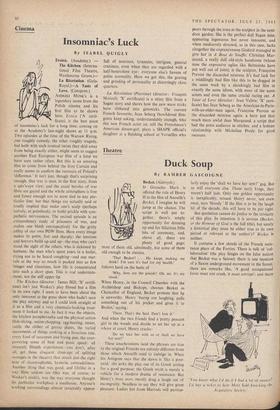Cinema
Insomniac's Luck
By ISABEL QUIGLY Eroica. (Academy.) — The Kitchen. (Interna- tional Film Theatre, Westbourne Grove.)— La Recreation (Gala- Royal.)—A Taste of Love. (Compton.) ANDRZEJ MUNK'S is a legandary name from the Polish cinema and his first film to be shown here, Eroica ('A certi- ficate), is the best piece of insomniac's luck for a long time, coming on at the Academy's late-night shows at II p.m. Two episodes at the time of the Warsaw Rising, one roughly comedy, the other roughly tragedy, but both with such ironical twists they skid away from being exactly either, might seem to suggest another East European war film of a kind we have seen rather often. But this is an amazing film to come from behind the Iron Curtain and really seems to confirm the rumours of Poland's 'difference.' It isn't just, though that's surprising enough, that war is seen, in the first story, from a spiv's-eye view, and the usual heroics of war films are guyed and the whole atmosphere is free and funny enough not to seem tied to any par- ticular line; but that things are actually said or loudly implied that make one's scalp (perhaps naïvely, or pointlessly, or both) prickle with sym- pathetic nervousness. The second episode is an extraordinary study of prisoners of war, and makes one blush retrospectively for the grisly jollity of our own POW films. Here every image makes its point, fast and sharply; the tensions and horrors build up and up—the man who can't stand the sight of the others, who is sickened by humans; the man who's spent years in a boiler, trying not to be heard coughing—and one mar- vels at the way so much is packed into so few images and situations, how life is concentrated into such a short span. This is real understate- ment; not the stiff upper lip.
The Kitchen (director: James Hill; 'X' certifi- cate) isn't just Wesker's play filmed but a film in its own right. I seem to have been about the only innocent at the press show who hadn't seen the play anyway and so I could look straight at it as a film and a very cinematic-looking treat- ment it looked to me. In fact it was the objects, the kitchen paraphernalia and the physical action (fish-slicing, onion-chopping, egg-beating, steam, rattle, the slither of greasy plates, the varied movements of things cooking at a ferocious rate, every kind of saucepan and frying pan, the over- powering sense of heat and panic speed : all intensely filmish experiences—you don't, after all, get those eloquent close-ups of splitting sausages in the theatre) that struck just the right note of claustrophobia, hysteria, comradeliness. Another thing that was good, and lifelike in a way films seldom are (this was, of course, to Wesker's credit), was the way everyone thought his particular workplace a madhouse. Anyone's working surroundings almost invariably appear full of neuroses, tyrannies, intrigues, general craziness, even when they are regarded with a half-benevolent eye: everyone else's havens of polite normality. Here we got this, the grating and grinding of personality at distortingly close quarters.
La Recreation (Playtime) (director : Francois Morcuil; 'X' certificate) is a shiny film from a Sagan story and shows how the new wave tricks have slithered into gimmicks. The current French favourite, Jean Seberg (bewildered film- goers keep asking. understandably enough, who this new French actor is), still the Frenchman's American dream-girl, plays a SHAPE official's daughter at a finishing school at Versailles who peers through the trees at the sculptor in the next- door garden. She is the perfect dull Sagan miss, appearing ingenuous but never innocent, and when mediocrely directed, as in this case, lacks altogether the expressiveness Godard managed to give her in A Bout de Souffle. Christian Mar- quand, a really dull old-style handsome (whose nose the expressive uglies like Belmondo have put well out of joint), is the sculptor, Frangoise Prevost the discarded mistress. It's bad luck for a middlingly bad film like this to be dogged in the same week by a shriekingly, bad film in exactly the same idiom, with most of the same actors and even the same crucial racing car. A Taste of Love (director: Jean Valere; 'X' certi- ficate) has Jean Seberg as the American-in-Paris- with-an-older-man again, Francoise Prevost as the discarded mistress again, a hero just that much more awful than Marquand. a script that had the press audience in stitches, and a lesbian relationship with Micheline Presle for good measure.


















































 Previous page
Previous page